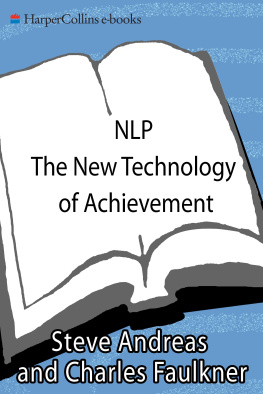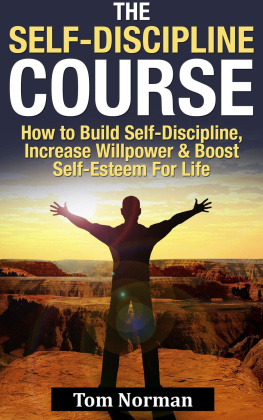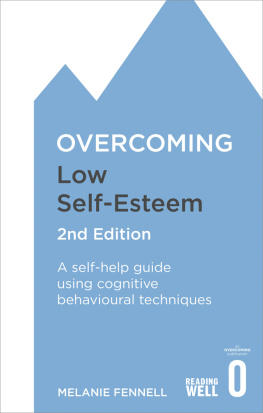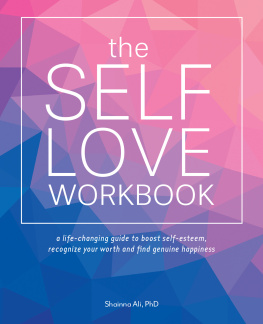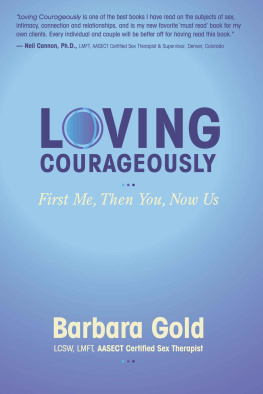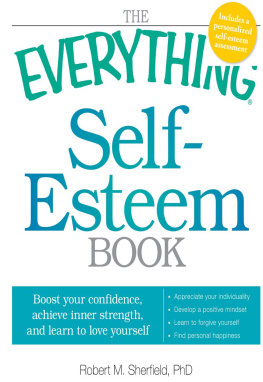Steve Andreas
Real People Press
Copyright 2012 by Real People Press
1221 Left Hand Canyon Drive, Boulder CO 80302
Cover photo sculpture "Self Made Man," by Bobbie Carlyle, Loveland, CO
to my wife
Connirae
full partner
at home
and at work
for so many years
Contents
Basic Understandings
How a self-concept that is aligned with values results in self-esteem.
Why a good self-concept is a fundamental key to your success in life.
The essential criteria that make your self-concept work well.
Strengthening the Self
Discover and improve the unique structure of your self-concept.
Make sure your self-concept functions well all the time.
Enriching and enhancing who you are, and what you can do.
Expanding the Self
Your mistakes can make your self-concept stronger and more accurate.
Using mistakes to become even more of who you want to be.
Create an entirely new desired quality or attitude for yourself
Transforming the Self
Make a weak quality into a strong basis for who you want to be.
How thinking of who you are not can be destructive, and how to change it.
Change a negative attitude into the positive one that you want.
Boundaries of the Self
How to create inner boundaries that protect you more effectively.
How to be intimate, while retaining a strong sense of yourself.
References
Index
Acknowledgement
When I have thought of whom to acknowledge for their help in developing what is presented in this book, and for creating the book itself, I have always gotten stuck between my first thought, "Where should I start?" and the next, "Where should I end?"
So many people have contributed to this work, and the life that it arises out of, that it would take another book to list them all!
Over a period of more than two-thirds of a century, many have contributed to my life and work: from parents, teachers, friends, family members, children, workshop participants,, and the beauty of art and science and nature... to chance encounters with strangers, stray comments, books and newspapers, TV shows, and so many other events that have had a part in shaping my life.
Who could say which were more important in weaving that intersection of circumstance that I call "myself" - who to include and who to leave out?
What a privilege to live here at this nexus of events - like a small wave that briefly emerges from the ocean, and then as quickly rejoins it! Tears of gratitude at the thought.
So I have decided to keep it simple. Most of you know who you are; I thank you all. You have all been part of this brief journey, and you have all become a part of who I am. Again, many thanks.
Introduction
Do you ever say, or think to yourself, "I'm disappointed with myself; I thought I could do that, but I really blew it," "I wish I felt better about myself," or "I'm so mad at myself; I fall apart at the slightest criticism." How about, "I'm so frustrated with myself," "I'm my own worst enemy; I keep sabotaging myself," or "I wish I could get myself to do that" (or stop doing that)?
Have you ever wondered how you got into this unpleasant struggle between "I" and "myself," or how you can get out of it ? You know that this struggle isn't necessary, because you also have times when you are very pleased with yourself, satisfied with your decisions and actions. Both your failures and successes often result from the beliefs that you have about yourself, what is often called identity or self-concept. The book that you have in your hands is a practical manual that can teach you how to strengthen the qualities in yourself that you like, and change the qualities that don't like, so that you can have a much better and more satisfying life.
Describing vs. Doing
About ten years ago I was invited to teach at a weekend drug and alcohol conference for therapists and social workers. I was one of about two dozen presenters, including several "big names" in the field. Although I was scheduled for the last session, I attended the entire conference to see what I could learn. I heard many different presenters talk about the importance of self-concept and self-esteem in getting people to stop using drugs. But in all their words there was virtually nothing about what self-concept or self-esteem actually was, or how to help someone get some of it.
Finally on Sunday afternoon I had my group, my little opportunity. I began by saying to them, "I have been hearing from many presenters, for a day and a half now, that a good self-concept and self-esteem are really important in getting people to stop using drugs. Do you all agree with that?" "Oh, yeah," they all nodded their heads. I said "Good. I have two questions for you. The first question is, "What is it that you've been talking about that is so important?' And my second question is, "How would you go about helping someone get some of it?' " When I asked those questions the room got very quiet. Then I said, "Let's pretend that I'm someone who is hooked on drugs. Help me improve my self-concept, or give me some self-esteem. Help me out."
Someone said, "Well, you could use operant conditioning."
I said "Great! Condition me, now . Show me what you can do." The room got very quiet again. Then someone said something about healing past traumas, and I said, "OK, let's imagine that I was sexually abused as a child. Show me how to heal that." The room got very quiet again.
I kept that up for about half an hour before demonstrating a few quick ways to work with self-concept, because I wanted them to realize very clearly that I was presenting something that was very different from what they already knew. I also wanted to make a very clear distinction between being able to describe self-concept, and being able to actually change it. They had been speaking theoretically, but there really wasn't much that they could do .
As I was walking down the hall after my presentation, a man walked along beside me, looking very thoughtful. Then he said to me, "You know, I have been teaching about self-concept and self-esteem for years, and I have even written a book about it. But when you asked those questions, I had nothing to say."
Problems vs. Solutions
There are many thousands of "self-help" books on the shelves of bookstores and libraries everywhere. When I searched on Amazon books for "self-concept," I found 177 titles; "identity" turned up 6,593 titles, and "self" turned up 32,000! Unfortunately, nearly all of them are focused on problems, rather than solutions . Those books are full of descriptions of problems - theories, examples, stories, and case histories, but very little about how to solve them. The last book I read about self-concept had 184 pages describing problems of self-concept, but only 7 pages at the end discussed possible solutions, in vague and theoretical terms.
Psychiatry's Diagnostic and Statistical Manual of Mental Disorders DSM IV-R has 873 pages of descriptions of how people can be mentally ill, but not a single page about how they could be helped! Imagine what it would be like if a medical doctor were in this position-she has an 873 page manual describing how someone can be ill, but not a single word about how to treat illness! Sadly, that is the position of most psychology and psychotherapy today-and most psychiatry, with its bias toward drug solutions, is even worse.
When books do set forth worthwhile goals or solutions, they very rarely tell you what you can actually do to achieve them. If a medical text were like that, it might tell you that the solution to a certain illness is to remove the diseased tissue, but without telling how to do that-all the details of the surgical procedure, use of scalpels, clamps, sutures, antiseptics, anesthetics, etc., that you could use to accomplish that useful goal.


